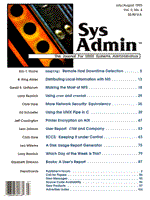
Listing 3: Writing to the pipe example
1 /* Listing 3
2 * Writing to the pipe example
3 */
4 #include <stdio.h>
5
6 main()
7 {
8 static char *slines[] =
9 {
10 "This is the first line of the example",
11 "and this is the second line",
12 "and of course this is the third"
13 };
14 char *com_str="cat > ascii.file";
15
16 run_wpipe(slines, 3, com_str);
17 }
18 /*
19 * This function:
20 * 1) creates a pipe.
21 * 2) creates another process with fork().
22 * 3) couples standard input to the reading end of the pipe
23 * using the dup() call.
24 * 4) closes file descriptors.
25 * 5) executes the child process.
26 * 6) closes the read side of the pipe.
27 * 7) opens the write side of the pipe using fdopen().
28 * 8) writes the number of input lines.
29 * 9) closes the file pointer.
30 *
31 * lineptr is an array-of-pointers where each element is a string
32 * to be written to the pipe.
33 */
34 int run_wpipe(lineptr, nolines, exe_str)
35 char *lineptr[]; /*array-of-pointers to strings */
36 int nolines; /*number of lines to write */
37 char *exe_str; /*pipe command */
38 {
39 int i, p[2], pid;
40 FILE *ptr, *fdopen();
41
42 if(pipe(p) < 0)
43 fatal("pipe call");
44
45 switch(pid=fork())
46 {
47 case -1:
48 fatal("fork call in run_wpipe");
49 case 0:
50 close(0); /*close the standard input */
51 dup(p[0]); /*read side of the pipe */
52 close(p[0]); /*save the file descriptors */
53 close(p[1]);
54 execlp("/bin/sh", "sh", "-c", exe_str, NULL);
55 fatal("exec call in run_wpipe");
56 }
57 close(p[0]); /*close the read side of the parent */
58 if((ptr=fdopen(p[1],"w")), ptr == NULL)
59 fatal("fdopen call in run_wpipe");
60
61 for(i = 0; i<nolines; i++)
62 fprintf(ptr,"%s\n", lineptr[i]);
63 fclose(ptr);
64 /*wait for child process to finish*/
65 while(wait((int *)0) != pid)
66 ;
67 }
/* End of File */
|